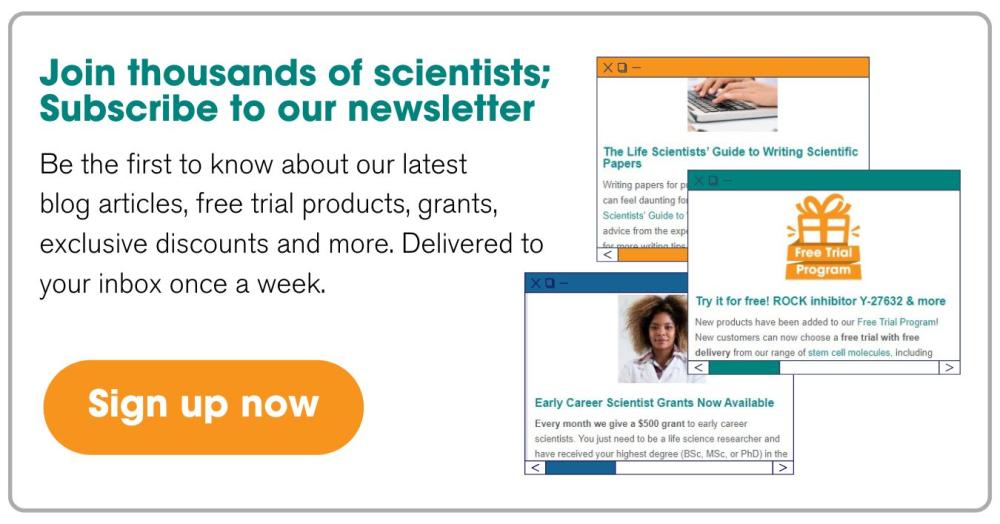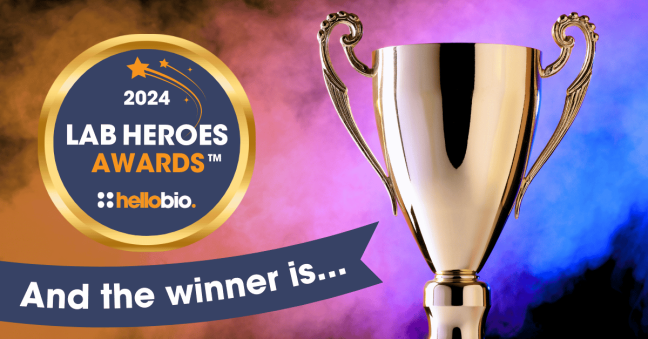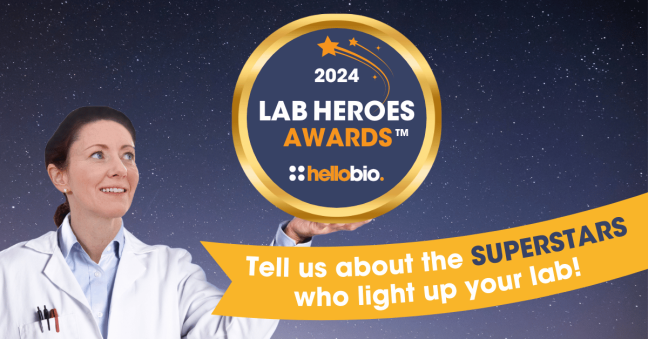Meet Our Lab Heroes Awards™ 2024 Highly Commended Nominees: Molly Kent
It’s time to meet another of our Lab Heroes Awards Highly Commended nominees for 2024! Our judging panel chose Molly Kent as one of ten ‘Lab Stars’ after being nominated by a colleague at the University of Richmond, USA.
Kitty Hartvigsen described Molly as “a leader of character” who “makes the lab environment an inviting, motivating and enriching experience for all”. She was also praised for her commitment to community outreach events and her “unparalleled dedication to serving others in the research lab.”
Molly is currently an Assistant Professor at the Virginia Military Institute, and her role involves teaching and advising undergraduate researchers. She has worked in immunohistology, genomic neuroscience research, and course development in molecular and cellular biology. She has completed postdoc roles at the University of Illinois and Randolph-Macon College, as well as the University of Richmond, USA.
We spoke to Molly about her career to date, and her passion for community outreach projects!
Congratulations, Molly! How did it feel to know that your colleague had nominated you as their Lab Hero?
I was honored to be nominated by my colleague as their lab hero. The nomination was completely unexpected.
How did it feel to learn you had been named as a 'Highly Commended' nominee?
I was surprised to learn that I was named as highly commended. Looking through all the nominations, there were so many amazing lab heroes from across the world.
Why do you think it’s so important to celebrate life science researchers, and what more could be done to show recognition in life science?
So many researchers help out never expecting recognition for the work they do. To have an organization solicit nominations to highlight those hard working scientists is unexpected but needed at the same time. Many of us work very hard to help others accomplish their science goals without recognition.
What do you enjoy most about working in STEM?
My favorite part of working in STEM is educating the next generation. I love asking questions and digging into the research to find answers. Being able to share that passion with my students and help them find their career path is incredibly rewarding.
Did you always want to be a scientist when you were younger, and if so, why?
I have always loved science. The field of study has changed a bit since I was younger. After entering college, I learned about how neuroscience combines the fields of psychology and biology. Once I heard about neuroscience I was hooked.
Can you tell us a bit more about what you're working on at the moment?
My lab focuses on student driven projects. I want my students to ask questions about neuroscience that excite their curiosity. Currently we have ongoing projects looking at stress and resilience in different animal models.
What does a typical working day look like for you?
Being at a primary undergraduate institution, my day focuses mostly around students. I am teaching, advising or guiding undergraduate researchers. During the summer, my students and I are able to delve into brain, behavior and hormones. We start the day caring for our animal models, conducting behavioral experiments and collecting samples. At the end of the summer, we stain brains and measure hormones from each experiment we ran. During the following school year we are able to analyze the samples we collected and apply our findings to the field at large.
Your colleague praised your dedication to outreach events. Why are they so important, and what more could be done to encourage young people to take an interest in STEM?
Exposing students to the fascinating parts of science and fostering the next generation of scientists is why I am dedicated to outreach events. I had never heard of the field of neuroscience until I got to college. Many young scientists do not know all the opportunities that are available to them. Outreach also allows me to educate many about the importance and versatility of the brain. There can be a lot of false information circulating at any moment. Through outreach opportunities, I am able to educate young individuals on how to think critically about what they see in the news and on media outlets. By educating the next generation, we can foster new thought and inevitably find new ways to cure disease.
What do you think are the biggest challenges facing life scientists in general at the moment?
I think retaining good scientists and educators is a challenge facing life scientists at the moment. Funding can always be a problem that leads to many leaving the field. Having qualified, enthusiastic educators can also limit the number of young scientists adding to the field.
What key piece of advice would you give to a younger scientist just starting out in their career?
Don’t give up. Graduate school is tough and getting into academia is also tough but if this is your dream, keep fighting. Being able to love what you do for a career is a rare commodity. That love and passion will permeate all you do and attract many others to the field as well.
How do you see your career developing in the future/where do you see yourself in 10 years?
I hope to still be in academia in the next 10 years. I love teaching and working with the younger generation. I plan to continue doing this for as long as they will let me.
Who is YOUR lab hero? Which scientist or mentor has inspired you the most in your career so far?
I have three main lab heroes in my life. Antony Stretton PhD was my first research mentor and gave me the opportunity to conduct research in his lab. He fostered my love of science and showed me what it means to be a mentor. Alison Bell PhD took a chance on me as a graduate student. She helped me expand my field of knowledge and begin to ask new and exciting questions. She was also patient with me as I figured out what I wanted to do with my career. Finally, Kelly Lambert PhD gave me the opportunity to discover undergraduate teaching and research by hiring me as a teaching post doc. We continue to collaborate and work together to this day. I would not be a tenure track professor today without the help of the three people listed and many others along the way. I have truly been fortunate with the amazing people that I can call heroes in my life.
What’s your favourite science quote?
My favorite quote is one that pertains to research and teaching, “You teach me, I forget. You show me, I remember. You involve me, I understand” (Edward O. Wilson). Exposing students to hands-on learning opportunities can help them understand the world around them better.
Is there anything else you would like to tell us, eg. specific issues or initiatives in science that you are involved with or are passionate about?
As a brain cancer survivor, I am incredibly passionate about research that has bench to bedside opportunities. I was diagnosed shortly after defending my PhD thesis and would not be where I am today without the hard work of so many scientists.
________________________________
Thank you so much for speaking to us Molly! And congratulations once again on being highly commended!
Connect with Molly:
Find out more about our Lab Heroes Awards™ 2024 winner and highly commended nominees here: https://hellobio.com/blog/meet-the-lab-heroes-awards-2024-winner.html
________________________________
If you enjoyed this article, why not check out the other resources available on our blog. We are passionate about supporting life scientists including early career life scientists and PhD students - with really low-priced reagents, antibodies and biochemicals, early career scientist grants, and resources to help with both personal and professional development. We know how tough it is - so we hope you find these helpful!
More General Support for Life Scientists
For advice on wellbeing, dissertations, presenting at conferences, wellbeing, PhD support, networking and lots more, we have a huge range of articles to help - just click below:
Save up to 50% on our high purity reagents...
When you get to the stage of planning your experiments, don't forget that we offer a range of low-cost, high-purity agonists, antagonists, inhibitors, activators, antibodies and fluorescent tools (yes - they really are around half the price of other suppliers!) You can use our Quick Multi-Search Tool to search for lots of products in one go, and the range includes:
- Enzyme inhibitors and activators
- Chemogenetic ligands
- Ion channel modulators
- GPCR & ionotropic receptor ligands
- Cell biology reagents & biochemicals
Technical resources
Try our Molarity Calculator: a quick and easy way to calculate the mass, volume or concentration required for making a solution.
Try our Dilution Calculator: an easy way to work out how to dilute stock solutions of known concentrations
We also offer a comprehensive range of technical resources including antibody protocols and methods, product guides and mini-reviews:
And finally, don't forget to check back in with our blog regularly for our latest articles. If there’s something you’d love to contribute to the community, whether that’s an interview or article, drop us a line at hello@hellobio.com
---
























